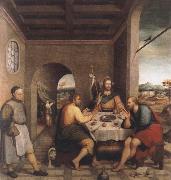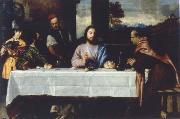Wholesale Oil Painting Reproductions No Minimum and Door to Door! |
|||||||||||
|
|
|||||||||||

|
|||||||||||
|
|
|
||||||||
All Jacopo Bassano Oil Paintings |
||||||||
|
|
||||||||
|
|
||||||||
|
Artist Introduction: Italian
c1510-1592
Jacopo Bassano Gallery
He was apprenticed to his father, with whom he collaborated on the Nativity (1528; Valstagna, Vicenza, parish church). In the first half of the 1530s Jacopo trained in Venice with Bonifazio de Pitati, whose influence, with echoes of Titian, is evident in the Flight into Egypt (1534; Bassano del Grappa, Mus. Civ.). He continued to work in the family shop until his fathers death in 1539. His paintings from those years were mainly altarpieces for local churches; many show signs of collaboration. He also worked on public commissions, such as the three canvases on biblical subjects (1535-6; Bassano del Grappa, Mus. Civ.) for the Palazzo Communale, Bassano del Grappa, in which the narrative schemes learnt from Bonifazio are combined with a new naturalism. From 1535 he concentrated on fresco painting, executing, for example, the interior and exterior decoration (1536-7) of S Lucia di Tezze, Vicenza, which demonstrates the maturity of his technique. |
||||||||
|
|
||||||||
|
The meal in Emmaus Painting ID:: 45537 |
mk186
1537/38 Cittadella parish church sacristy |
|||||||
Height Width |
INS/CM Quality |
|||||||
|
X |
| |||||||
|
|
||||||||
All Caravaggio Oil Paintings |
||||||||
|
|
||||||||
|
|
||||||||
|
Artist Introduction: Italian Baroque Era Painter, ca.1571-1610
Italian painter. After an early career as a painter of portraits, still-life and genre scenes he became the most persuasive religious painter of his time. His bold, naturalistic style, which emphasized the common humanity of the apostles and martyrs, flattered the aspirations of the Counter-Reformation Church, while his vivid chiaroscuro enhanced both three-dimensionality and drama, as well as evoking the mystery of the faith. He followed a militantly realist agenda, rejecting both Mannerism and the classicizing naturalism of his main rival, Annibale Carracci. In the first 30 years of the 17th century his naturalistic ambitions and revolutionary artistic procedures attracted a large following from all over Europe. |
||||||||
|
|
||||||||
|
|
The meal in Emmaus Painting ID:: 45588 |
mk186,
1601 London, Natinal Gallery |
||||||
Height Width |
INS/CM Quality |
|||||||
|
X |
| |||||||
|
|
||||||||
All TIZIANO Vecellio Oil Paintings |
||||||||
|
|
||||||||
|
|
||||||||
|
Artist Introduction: Italian painter, Venetian school (b. 1490, Pieve di Cadore, d.
1576, Venezia). |
||||||||
|
|
||||||||
|
|
The meal in Emmaus Painting ID:: 45634 |
mk186
around 1535
Paris muse you Louvre |
||||||
Height Width |
INS/CM Quality |
|||||||
|
X |
| |||||||
|
|
||||||||
|
Prev Next
|
||||||||
|
|
||||||||
|
Related Paintings to TIZIANO Vecellio :. |
||||||||
|
|
||||||||
|
CONTACT US |



